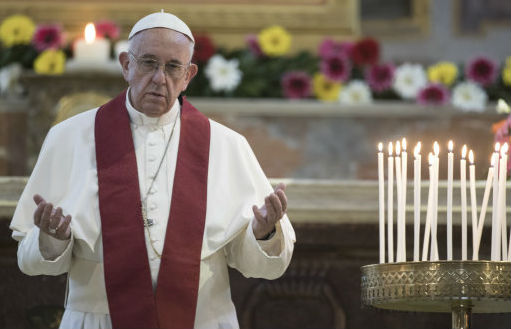Pope Francis has issued a new law returning authority to bishops’ conferences over liturgical translations, paving the way for the current English missal to be revised.
The new law, which is part of the Argentinian Pontiff's attempts to shore up the the reforms to Catholic worship started by the Second Vatican Council, says that bishops now have the power to complete translations of the Mass from Latin into local languages.
The Pope’s order “Magnum Principium” amends Canon Law (Canon 838.3) to say bishops are required to “faithfully” prepare and “approve” translations which are then confirmed by Rome. The words “faithfully” and “approve” are both new.
This throws open the possibility that the 2011 English Roman Missal - which became mired in disagreement with claims that the Vatican had overly controlled the process - could be changed. The onus will now be on local bishops to take the initiative.
Francis' law also reverses moves by his predecessors to centralise the translation process, which saw Vatican officials editing, and re-writing the work of bishops' conferences.
The foundation stone to his new law, Francis explained, is the “great principle” of Vatican II which stressed that “liturgical prayer be accommodated to the comprehension of the people so that it might be understood.” This task, he pointed out, had originally been entrusted to the bishops in countries across the world.
His law comes soon after a landmark speech to Italian liturgists where he declard that reforms to Catholic worship instituted after the 1962-65 council are “irreversible”, something he declared with “magisterial authority.”
Both the recent interventions will be read as ending attempts by those who would like to roll back Vatican II’s changes with a “reform of the reform.” They feel that the reforms to worship which took place after the council undermined the sacred character of the Mass, while also wanting to see a greater uniformity to liturgical celebration.
In 2001 the Vatican issued Liturgiam Authenticam which set out principles for translating the Mass into local languages from the Latin original. This called for more literal translations of the Latin into the vernacular, which contrasted with an earlier approach called “dynamic equivalence” where a translation took place according to the sense of words and phrases.
But this was controversial by many local bishops conferences who felt it was an example of Rome over reaching itself in the translation process.
“It is no surprise that difficulties have arisen between the Episcopal Conferences and the Apostolic See in the course of this long passage of work,” the Pope said, hinting at past disagreements.
The 2011 English missal was produced according to Liturgiam Authenticam and received a mixed response. Supporters praised it for being more faithful to the Latin and bringing in scriptural allusions, critics said it was clumsy and contained poor English.
Now, however, Francis’ new law undermines this ruling as well as Vatican attempts to interfere in the process of translations.
In an article released by the Vatican to help explain the new law, Archbishop Arthur Roche, the secretary to the Holy See’s liturgy department, said the 2001 ruling now needs to be “interpreted in the light” of the Pope’s latest changes.
Significantly it was Archbishop Roche, and not Cardinal Robert Sarah, the liturgy’s department prefect, who wrote the article. Cardinal Sarah has been a supporter of “Liturgiam Authenticam" and critical of some changes to the Mass which took place after Vatican II.
It was also Archbishop Roche whom the Pope asked to lead a low-key commission examining “Liturgiam Authenticam.” Although their existence was never formally confirmed by the Congregation for Divine Worship or anyone at the Vatican, the body met and reportedly sent a report to Francis.
In “Magnum Principium”, the Pope has been careful to stress the need for unity in the Roman Rite and that the Vatican still plays a role in translations. Francis also writes about the “sacrifice involved in the partial loss of liturgical Latin”, but said “it willingly opened the door so that these versions, as part of the rites themselves, might become the voice of the Church celebrating the divine mysteries along with the Latin language.”
Many critics to changes of the liturgy post-Vatican II lament the loss of Latin, which they stress the council called to be preserved.



 Loading ...
Loading ...